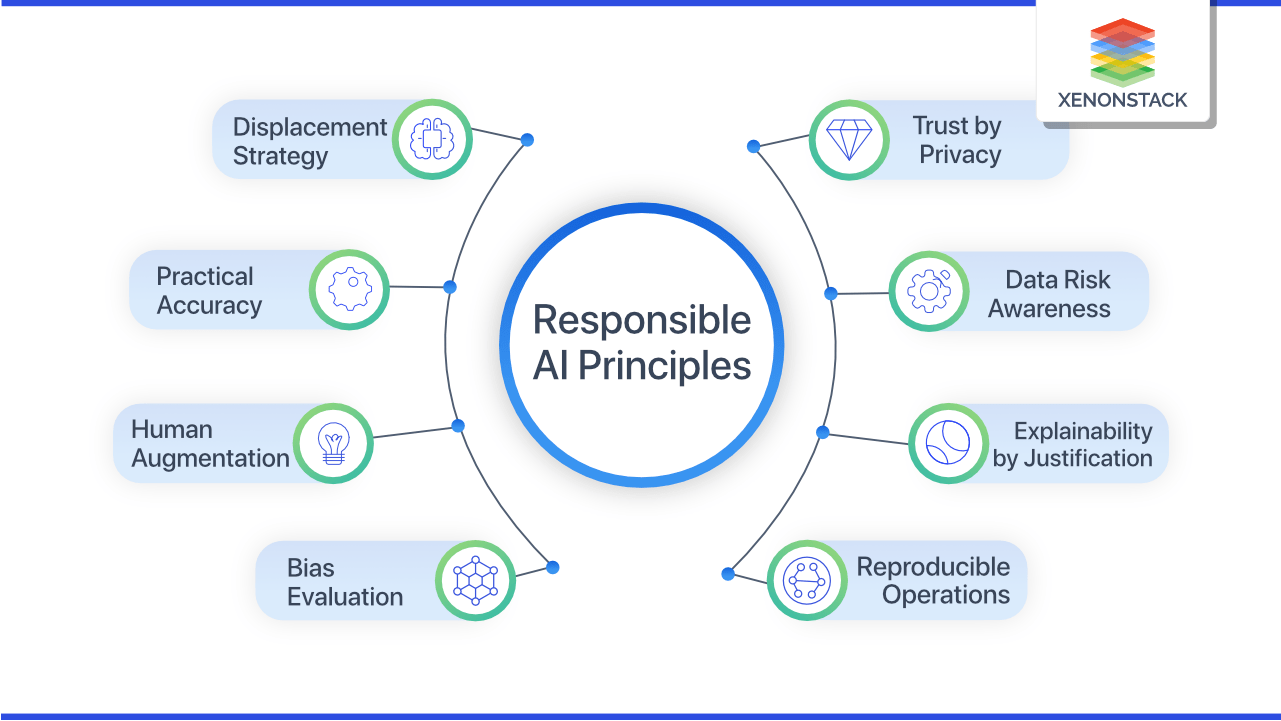Understanding AI's Learning Process: Implications For Responsible Technology

Table of Contents
How AI Learns: A Deep Dive into Machine Learning Techniques
AI's ability to learn stems primarily from various machine learning techniques. Understanding these techniques is fundamental to grasping the implications of AI for responsible technology.
Supervised Learning
Supervised learning involves training an AI model on a labeled dataset. The model learns to map inputs to outputs based on the provided examples. For instance, in image recognition, the model is trained on images labeled with their corresponding objects (e.g., "cat," "dog"). Spam filtering is another example, where the model learns to classify emails as spam or not spam based on labeled training data.
- Data labeling importance: The accuracy of supervised learning heavily relies on the quality and completeness of the labeled data.
- Potential for bias in training data: If the training data reflects existing societal biases, the AI model will likely perpetuate and even amplify those biases.
- Accuracy dependence on data quality: Noisy, incomplete, or poorly labeled data can significantly reduce the model's accuracy and reliability.
Unsupervised Learning
Unlike supervised learning, unsupervised learning involves training an AI model on unlabeled data. The model learns to identify patterns and structures within the data without explicit guidance. Customer segmentation, where the model groups customers based on their purchasing behavior, is a common example. Anomaly detection, identifying unusual data points that deviate from the norm, is another application.
- Discovery of hidden patterns: Unsupervised learning excels at uncovering hidden relationships and patterns in large datasets.
- Challenges in interpreting results: Interpreting the results of unsupervised learning can be challenging, requiring careful analysis and domain expertise.
- Applications in data exploration: This technique is invaluable for exploratory data analysis and gaining insights from complex datasets.
Reinforcement Learning
Reinforcement learning involves training an AI agent to interact with an environment and learn optimal actions through trial and error. The agent receives rewards for desirable actions and penalties for undesirable ones. This approach is frequently used in game playing (e.g., AlphaGo) and robotics, where the AI learns to navigate and manipulate its environment.
- Reward systems and their influence: The design of the reward system is crucial, as it directly shapes the agent's behavior. A poorly designed reward system can lead to unintended and undesirable consequences.
- Ethical dilemmas in reward design: Defining appropriate rewards can be ethically complex, particularly in scenarios with significant real-world impact.
- Potential for unintended consequences: The agent may find unexpected ways to maximize its reward, potentially leading to outcomes that are contrary to the intended goals.
The Data Dilemma: Bias, Privacy, and the Ethical Use of Data in AI
The data used to train AI models is paramount, yet it presents significant ethical challenges.
Bias in Training Data
AI systems inherit and can amplify biases present in their training data. This can lead to discriminatory outcomes in various applications. For example, biased facial recognition systems may misidentify individuals from certain ethnic groups, while biased loan application AI may unfairly deny credit to specific demographics.
- Examples of biased AI outcomes: Numerous documented cases highlight the dangers of biased AI in areas like criminal justice, healthcare, and employment.
- Methods for mitigating bias: Careful data curation, algorithmic fairness techniques, and diverse and representative datasets are crucial for mitigating bias.
- The importance of diverse and representative datasets: Training data should accurately reflect the diversity of the population to prevent bias and ensure fairness.
Data Privacy Concerns
The large-scale data collection required for training advanced AI models raises significant privacy concerns. Protecting individuals' data is crucial.
- GDPR and other data protection regulations: Regulations like the General Data Protection Regulation (GDPR) aim to protect individuals' data rights.
- Ethical considerations in data usage: Transparency, informed consent, and data minimization are essential for ethical data handling.
- Responsible data handling practices: Data anonymization, encryption, and robust security measures are crucial for protecting sensitive information.
Transparency and Explainability in AI: Building Trust and Accountability
A major challenge in AI is the "black box" problem—the difficulty in understanding how complex AI systems arrive at their decisions.
The Black Box Problem
Many deep learning models are opaque, making it difficult to trace their decision-making processes. This lack of transparency hinders accountability and trust.
- Challenges in interpreting model predictions: Understanding why an AI system made a specific prediction can be extremely difficult, especially for complex models.
- The need for explainable AI (XAI) techniques: Developing methods to make AI decision-making more transparent and understandable is crucial.
- The importance of transparency for accountability: Transparency is essential for identifying and rectifying errors, as well as for ensuring fairness and accountability.
Promoting Transparency through Explainable AI (XAI)
Explainable AI (XAI) aims to create AI systems whose decision-making processes are more understandable and interpretable.
- Examples of XAI techniques: Various techniques, such as LIME and SHAP, aim to provide explanations for individual predictions.
- Benefits of transparency for debugging and trust building: Transparency facilitates debugging, error detection, and builds trust among users.
- Limitations of current XAI approaches: Current XAI methods are still under development and may not always provide fully satisfactory explanations.
The Future of Responsible AI Development and Deployment
Building a future where AI benefits all of humanity requires a concerted effort from various stakeholders.
Regulatory Frameworks and Ethical Guidelines
Governments and organizations play a crucial role in establishing standards and regulations for responsible AI development.
- Examples of existing AI ethics guidelines: Numerous organizations have published guidelines for responsible AI development and deployment.
- The need for international cooperation: Given the global nature of AI, international cooperation is essential for establishing effective regulations.
- Challenges in regulating rapidly evolving technology: Keeping up with the rapid pace of AI development presents a significant challenge for regulators.
The Role of AI Researchers and Developers
AI researchers and developers have a primary responsibility to prioritize ethical considerations in their work.
- Importance of ethical training for AI developers: Integrating ethics into AI education and training is crucial.
- Incorporating ethical considerations into the design process: Ethical considerations should be integrated throughout the entire AI lifecycle, from conception to deployment.
- The need for ongoing monitoring and evaluation: Continuously monitoring and evaluating AI systems for bias, fairness, and unintended consequences is essential.
Conclusion: Understanding AI's Learning Process for a Responsible Future
Understanding AI's learning process is not merely a technical exercise; it's a fundamental requirement for building a responsible and ethical future with AI. We've explored the intricacies of machine learning techniques, the ethical challenges posed by biased data and privacy concerns, and the importance of transparency and explainability in building trust. The future of AI hinges on a collective commitment to responsible development and deployment. Learn more about responsible AI, explore the ethical implications of AI's learning process, and understand the future of AI development by focusing on responsible practices. Let's work together to ensure that AI benefits all of humanity.

Featured Posts
-
 Officials Warn Of Intensified Wildfire Season In Saskatchewan Due To Heat
May 31, 2025
Officials Warn Of Intensified Wildfire Season In Saskatchewan Due To Heat
May 31, 2025 -
 The Good Life Finding Purpose And Meaning In Your Everyday
May 31, 2025
The Good Life Finding Purpose And Meaning In Your Everyday
May 31, 2025 -
 Fda Grants Fast Track Designation To Sanofis Chlamydia Vaccine
May 31, 2025
Fda Grants Fast Track Designation To Sanofis Chlamydia Vaccine
May 31, 2025 -
 Rising Covid 19 Infections The Role Of A Potential New Variant Who Update
May 31, 2025
Rising Covid 19 Infections The Role Of A Potential New Variant Who Update
May 31, 2025 -
 Jan 6 Witness Cassidy Hutchinson To Publish Memoir This Fall
May 31, 2025
Jan 6 Witness Cassidy Hutchinson To Publish Memoir This Fall
May 31, 2025
